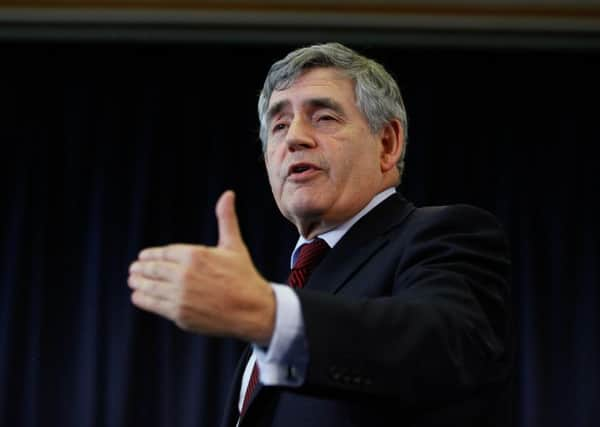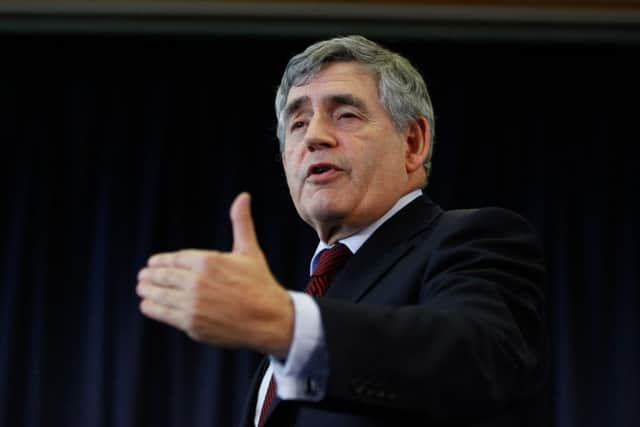Labour leadership: Gordon Brown ‘will not stand’


A straight fight for the leadership now looks increasingly likely between the MP and former Scottish secretary Jim Murphy and Neil Findlay, currently the party’s health spokesman at Holyrood.
Advertisement
Hide AdAdvertisement
Hide AdPotential contenders, including the party’s deputy leader in Scotland Anas Sarwar and rising stars Jenny Marra and Kezia Dugdale, all ruled themselves out as nominations opened yesterday.


Mr Brown, MP for Kirkcaldy and Cowdenbeath, was tipped as a possible replacement for Ms Lamont, with some party members holding him up as a unifying figure amid increasingly divergent views on the future direction of the party.
Senior Labour figures including Lord Foulkes and the Linlithgow and Falkirk East MP Michael Connarty had been openly calling for Mr Brown to return as party leader to meet the fresh SNP challenge when Nicola Sturgeon takes over as First Minister next month.
But a source close to Mr Brown said: “For the past four years, on every occasion he has been asked, Mr Brown has made it clear he is not returning to frontline politics and that continues to be the position.”
Candidates now have until next Tuesday to put themselves forward for the leadership.
Mr Findlay, a member of the left-wing Red Paper Collective, has criticised Labour’s limited devolution proposals. He was still assessing the situation before making a decision when contacted last night.
But the prospect of a more left-wing candidate at Holyrood leading the party was backed by North Ayrshire MP Katy Clark.
Ms Clark said: “We need to be very clear – Scottish Labour needs to move to the left. I think Johann [Lamont] was very clear when she said the focus on Scottish politics is moving to Holyrood.
Advertisement
Hide AdAdvertisement
Hide Ad“My view is that the ideal choice would be someone on the left and someone that is an MSP, so I very much hope we are given that option.”
Mr Murphy has fallen out of favour with Ed Miliband at Westminster after running his brother David’s party leadership campaign four years ago. He took on a prominent role during the independence referendum campaign with his 100-towns tour. He is also expected to make his position on the leadership clear in the coming days.
Labour MSPs and MPs held meetings in Glasgow and Westminster, respectively, about the future direction of the party yesterday.
Ms Lamont quit last Friday, lifting the lid on an acrimonious power struggle with Westminster colleagues she claimed treated Scotland as a “branch office”.
But shadow chancellor Ed Balls yesterday dismissed Ms Lamont’s concerns about UK Labour’s treatment of Scotland.
“We are a UK party but have a really vibrant and dynamic Labour Party in Scotland,” he said. “I saw the remarks, I understand she is resigning and in those moments you say those kinds of things.
“I think what people in Scotland want is a strong voice for Scotland in Scotland and in the UK, delivering in Holyrood and making sure the Scottish voice is heard loud and clear.
“I am confident the next Labour leader will do that.”
The SNP last night insisted that Labour will pay the price for the internal strife at the ballot box in next May’s general election, with polling evidence suggesting the Nationalists are poised to make big gains.
Advertisement
Hide AdAdvertisement
Hide AdSNP Glasgow MSP Stewart Maxwell said: “Having forced the resignation of Johann Lamont, it is clear that Westminster pulling Labour’s strings in Scotland is actually on the increase – with the polling consequences plain for all to see.
“With the latest polling analysis indicating Labour are now polling at just 26 per cent for next year’s UK general election, while SNP support has surged to 43 per cent, it is clear that people in Scotland are sick to death of Labour’s internal feuding.”
Former Labour MP Dennis Canavan, who chaired the official Yes campaign for Scottish independence during the referendum, said Labour’s current problems “date back to the days of New Labour”.
“When Tony Blair came on the scene he wanted to appeal to voters in middle England, and as a result he ditched every socialist policy that Labour ever had,” said Mr Canavan. He claimed Mr Blair “rather reluctantly” delivered Scottish devolution after it was handed down as “unfinished business” from his late predecessor John Smith.
Only an “independent Scottish Labour Party” would be worthy of the support of the people of Scotland, Mr Canavan said.
A recently convened group called Labour for Scotland, which includes former MSPs Frank McAveety and Pauline McNeill and has the support of current MSPs Michael McMahon and Cara Hilton, has urged Scottish Labour to change its name to the Independent Labour Party, become fully autonomous from London and back full control over income tax and welfare.
Candidates for the post of leader of the Scottish Labour Party were invited to declare their interest from yesterday.
Scottish Labour’s executive committee met at the weekend and agreed a timetable for the election process.
Advertisement
Hide AdAdvertisement
Hide AdNominations from MPs, MSPs and MEPs will open on Friday and close next Tuesday.
The ballot starts on 17 November and the new leader will be announced on 13 December.
SEE ALSO